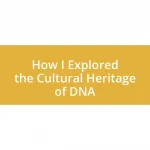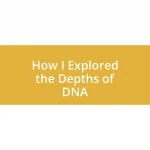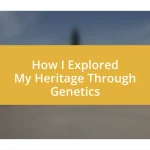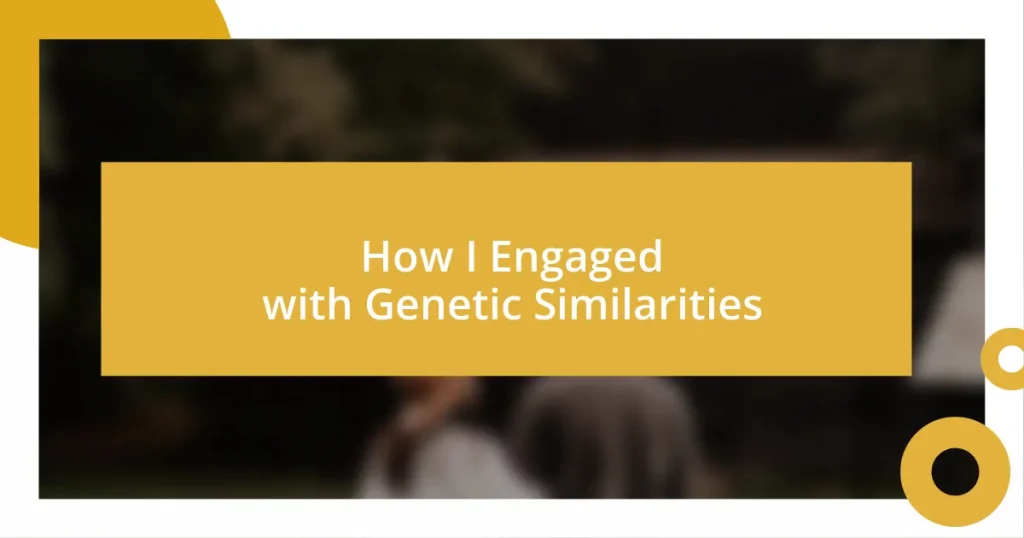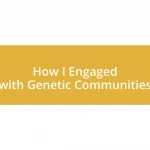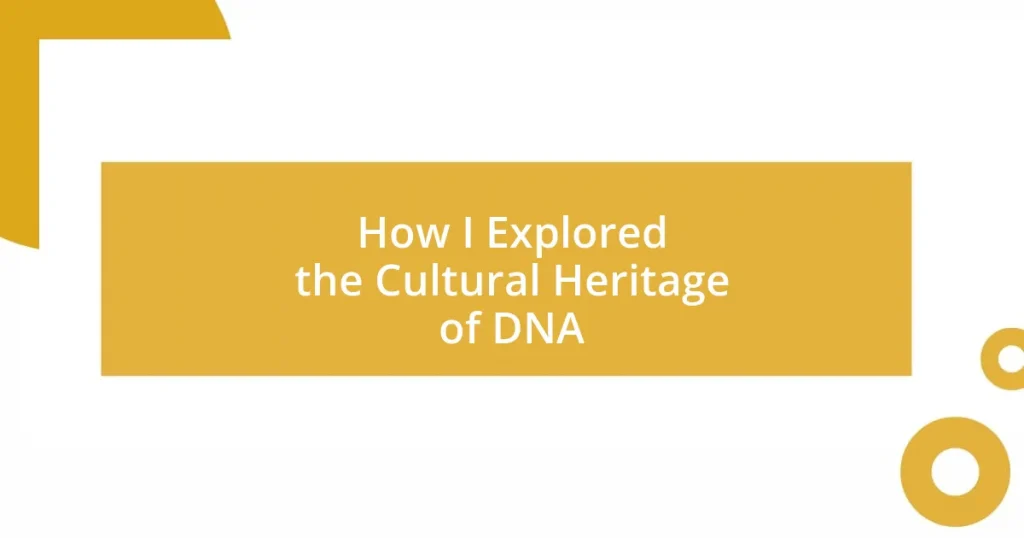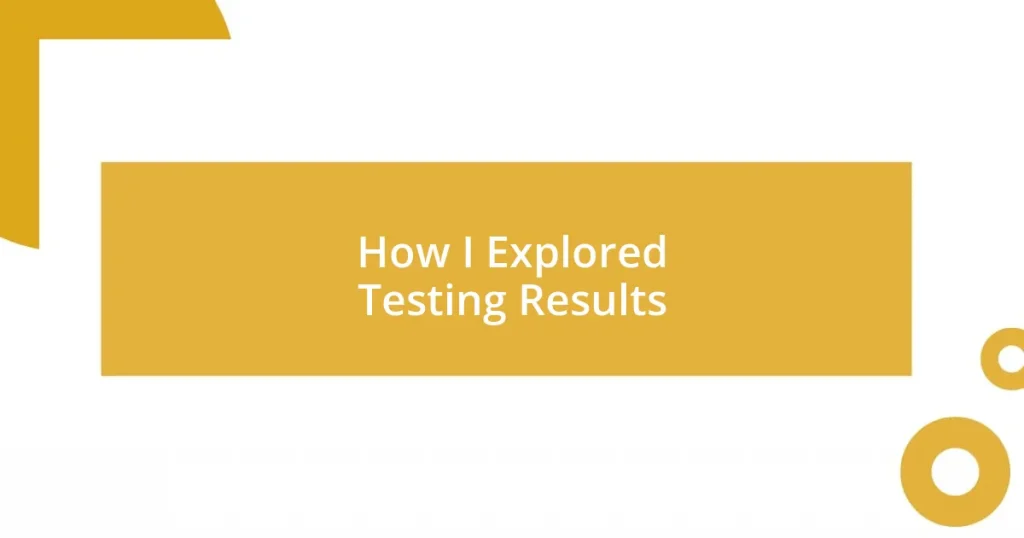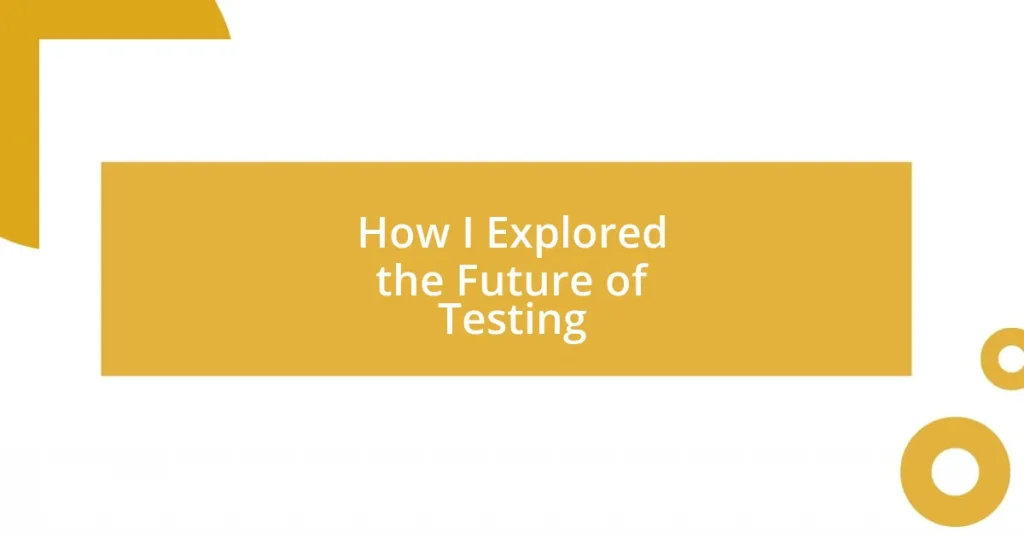Key takeaways:
- Genetic similarities provide insights into ancestry and health, fostering a sense of belonging and prompting questions about responsibility for future generations.
- Research in genetics aids in disease prevention, informs personalized medicine, and enhances our understanding of human evolution and diversity.
- Methods like genome sequencing, comparative genomics, and bioinformatics reveal complex biological relationships and personal health information.
- Ethical considerations are critical as advancements in genetics raise questions about privacy, discrimination, and the implications of genetic manipulation.
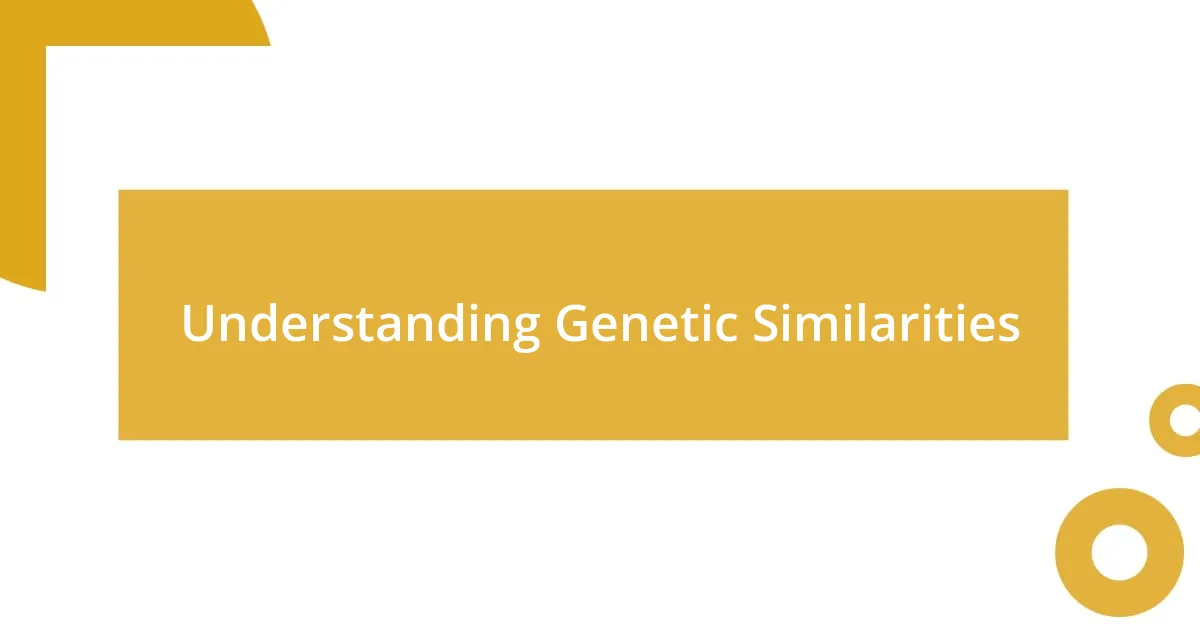
Understanding Genetic Similarities
Genetic similarities refer to the shared DNA sequences among individuals, which can reveal fascinating insights into our biological connections and heritage. I remember the moment I learned about my ancestral roots through a genetic test; it felt like opening a family history book that had been collecting dust for generations. Isn’t it intriguing how a simple DNA strand can connect us to people we’ve never met yet share a piece of our genetic makeup with?
In my experience, understanding these similarities often sparks an emotional response. For instance, discovering that I shared a significant percentage of my genes with a distant relative prompted a sense of belonging I hadn’t anticipated. It made me wonder—how many stories lie within those shared genes, waiting to be uncovered?
When exploring genetic similarities, I’ve come to realize that they extend beyond family ties. From research, I learned that certain traits or predispositions can be traced back through generations, shaping not just our identities but also our health outcomes. This realization raises questions about responsibility—how do we use this knowledge to improve our lives and those of future generations?
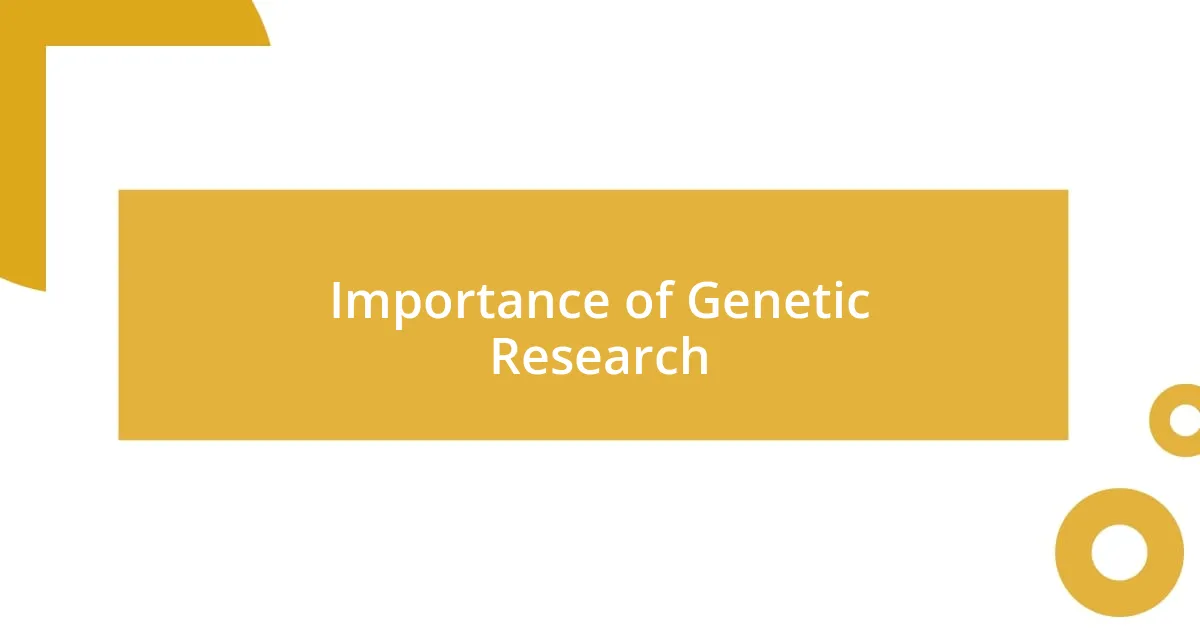
Importance of Genetic Research
Genetic research is a crucial avenue for understanding not just our lineage, but also the very fabric of human diversity. When I delved into recent studies, I was struck by how genetic research informs everything from disease prevention to personalized medicine. It’s as if we have a roadmap to better health, tailored specifically to our unique genetic makeup.
- It helps identify genetic disorders early, allowing for proactive management.
- It enhances our understanding of human evolution, showcasing the complexity of our species.
- It opens doors for innovations in treatments and therapies, particularly for genetic diseases.
Reflecting on my own journey, I recall reading about how certain genetic markers are linked to an increased risk of specific illnesses. This knowledge didn’t just empower me to engage in preventive health measures; it also cultivated a deeper sense of gratitude for medical advances. The thought that I could potentially avert or manage a condition thanks to genetic research is nothing short of exhilarating.
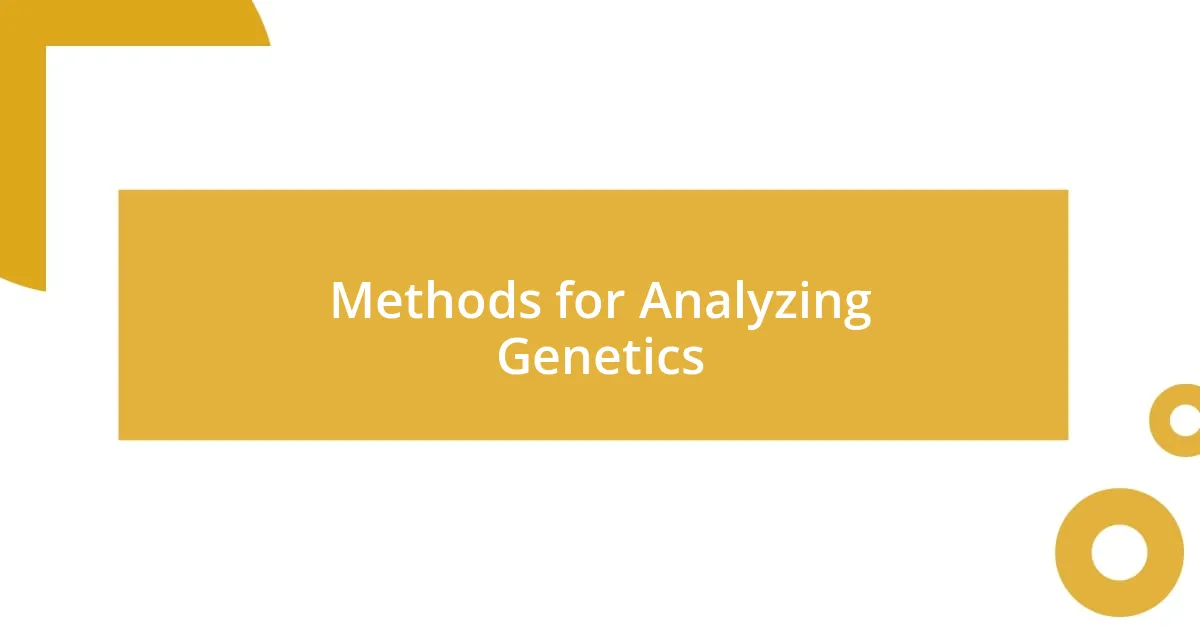
Methods for Analyzing Genetics
Analyzing genetics involves a variety of methods, each offering unique insights into our DNA. One of the most popular techniques is genome sequencing, which entails determining the complete DNA sequence of an organism’s genome. When I had my genome sequenced, the detailed information provided about not only my ancestry, but also potential health risks, was both awe-inspiring and nerve-wracking. It’s like peeling back layers of a complex puzzle that is me.
Another valuable method is comparative genomics, where researchers compare the genomes of different organisms. This comparison can reveal evolutionary relationships and functional insights. I find it fascinating to see how closely related we are to other species; for instance, learning that humans share about 98% of their DNA with chimpanzees made me reflect on our shared lineage. Such discoveries enhance our understanding of biology and inform conservation efforts, bridging connections between species and ecosystems.
Lastly, bioinformatics plays a pivotal role. It utilizes software and algorithms to analyze biological data, turning raw genetic information into comprehensible results. During my journey, I used bioinformatics tools to explore my genetic makeup, and the experience felt like conducting an orchestra where every note had a purpose in defining my identity. It’s remarkable how data can come alive through this method, unveiling stories about who we are at a molecular level.
| Method | Description |
|---|---|
| Genome Sequencing | Determining the complete DNA sequence of an organism’s genome to gain insights into ancestry and health. |
| Comparative Genomics | Comparing the genomes of different organisms to reveal evolutionary relationships and functional insights. |
| Bioinformatics | Utilizing software and algorithms to analyze biological data, making complex information accessible and insightful. |
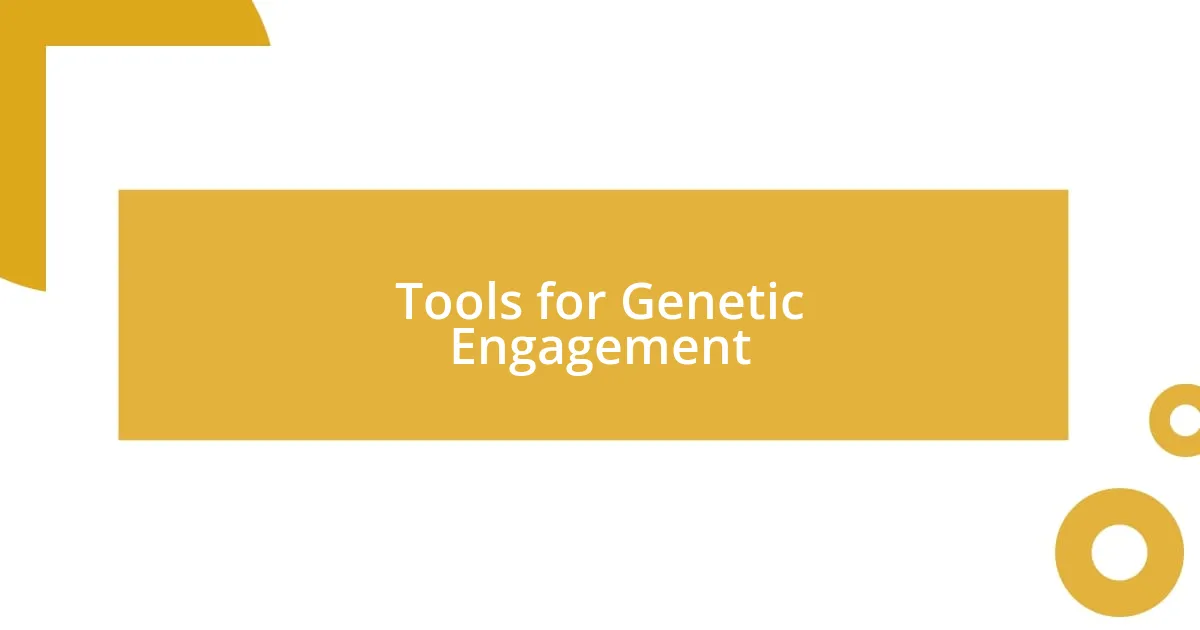
Tools for Genetic Engagement
In my journey to explore genetic similarities, I found that DNA testing kits have become invaluable tools for genetic engagement. Companies like 23andMe or AncestryDNA provide insights not just about one’s heritage but also genetic predispositions. When I first received my results, the emotion was overwhelming; it was as if a hidden part of my identity had finally been uncovered.
Another powerful tool is genetic counseling, which provides personalized support to navigate the complex information uncovered through genetic testing. I remember sitting down with a counselor who walked me through my results, helping me interpret the data. It transformed my experience from mere numbers on a page to a deeper understanding of my health and what steps I could take moving forward.
Moreover, bioethics discussions have emerged as essential tools for engaging with genetic information responsibly. They encourage critical thinking about how we use genetic data in society. Reflecting on these discussions often leads me to wonder: How can we ensure that advances in genetics benefit everyone? This engagement not only broadens my perspective but also highlights the vital importance of ethical considerations in the rapidly advancing field of genetics.
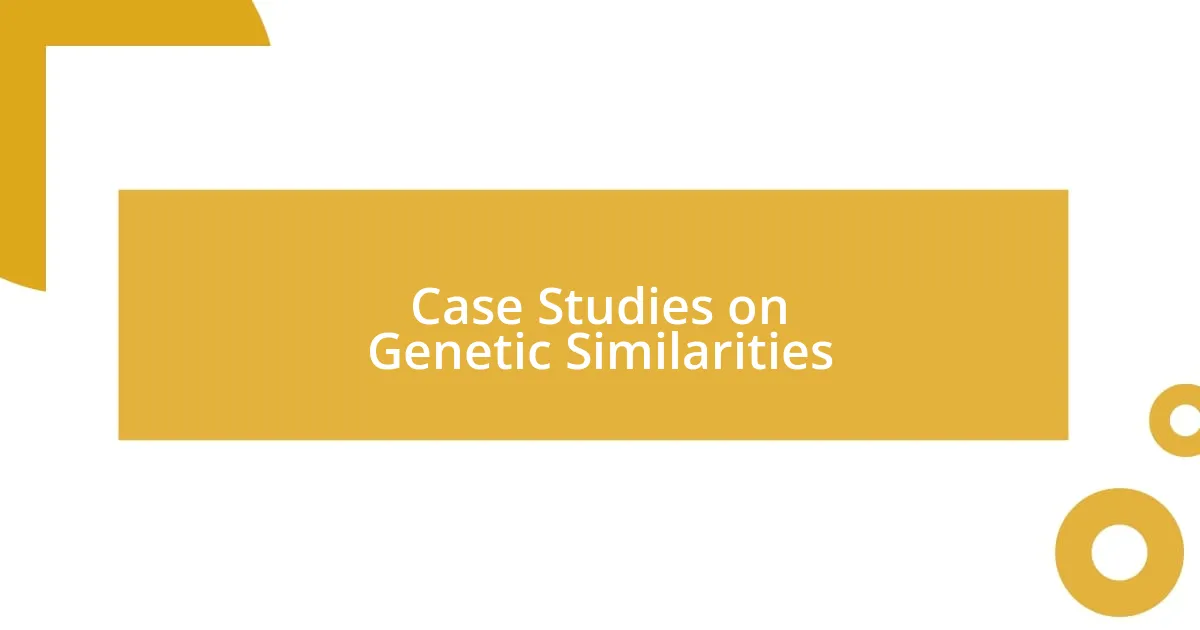
Case Studies on Genetic Similarities
I’ve come across several fascinating case studies on genetic similarities that truly illustrate the power of our shared DNA. One study that stuck with me involved individuals with identical twins. Researchers discovered that, despite identical genetic makeup, these twins led vastly different lives, showcasing how environment and experiences can shape our identities. It made me ponder the age-old question: If genetics play such a crucial role, how much do our choices truly matter in the grand scheme of who we become?
Another remarkable case study focused on a community in Italy with a high incidence of a rare genetic trait. Scientists investigated how intermarriage among relatives fostered this genetic similarity over generations. Learning about this niche community illustrated the idea of genetic drift—an evolutionary process where certain traits become more common due to chance. It drew me to reflect: how many hidden stories of our ancestry are just waiting to be explored within our own lineages?
Finally, there’s the research involving individuals with rare genetic disorders linking unsuspecting families together. One such case revealed that two families living continents apart shared a common ancestor, identified through a genetic similarity precipitated by a rare mutation. This finding made me feel a sense of comfort—connecting with strangers on a genetic level breaks down barriers and emphasizes our collective human experience. How intriguing it is to imagine that somewhere out there, we may all be more closely knit than we perceive!
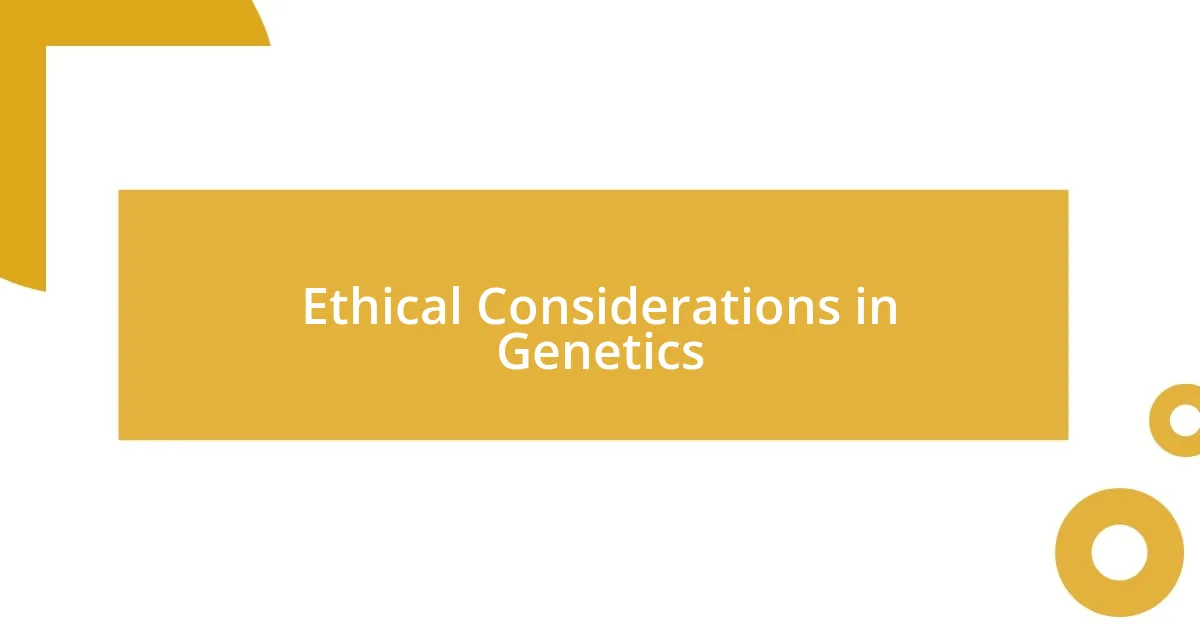
Ethical Considerations in Genetics
Ethical considerations in genetics are more crucial now than ever. I’ve often thought about the ramifications of sharing genetic data, especially with third-party companies. One question that frequently arises for me is: How much privacy are we willing to sacrifice for the sake of scientific progress? Navigating this space can feel daunting, as I realize the potential repercussions of my genetic information falling into the wrong hands.
Another concern that weighs on me is the potential for genetic discrimination. I remember reading about cases where individuals faced unfair treatment in healthcare or employment due to their genetic predispositions. This reality makes me wonder how we can advocate for protections that safeguard individuals from such discrimination. It becomes clear that while genetics can offer invaluable insights, the ethical frameworks surrounding their usage need to evolve to keep pace with technological advancements.
Lastly, the concept of “designer babies” stirs a mix of fascination and fear within me. The ability to edit genes could eliminate certain genetic diseases, yet I can’t help but question where we draw the line. Should we be tampering with human traits like intelligence or physical appearance? It’s a slippery slope, and I often find myself grappling with the ethical implications of playing God and how our choices could forever alter the fabric of humanity.
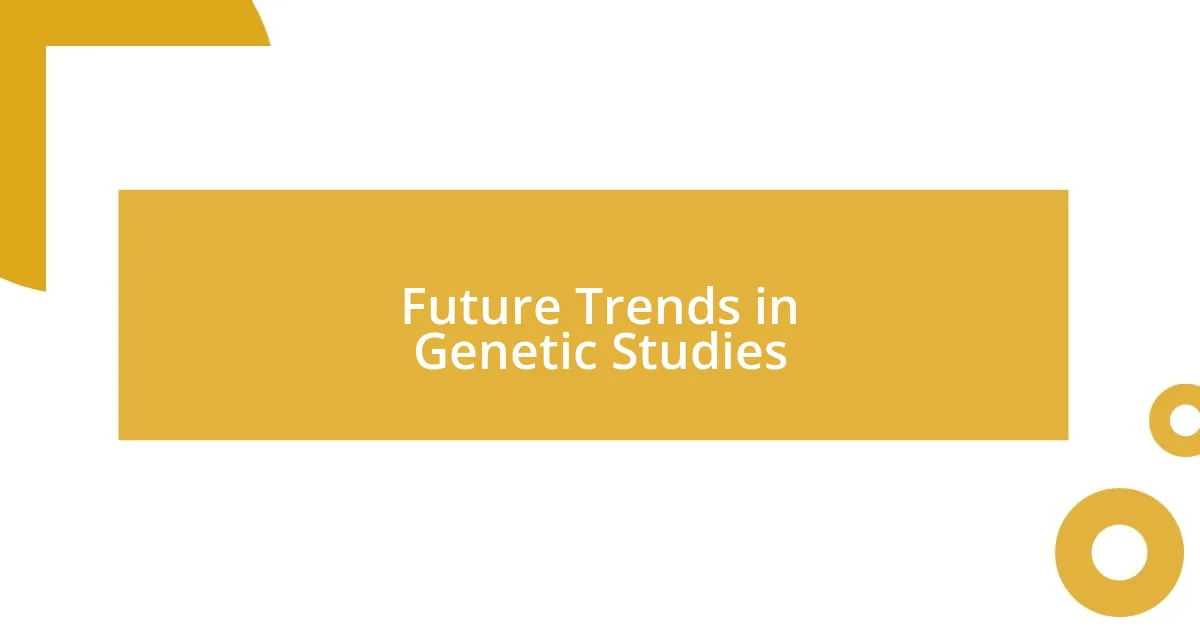
Future Trends in Genetic Studies
As I look to the future of genetic studies, I can’t shake the feeling that advancements in CRISPR technology will revolutionize how we approach genetic research. Imagine a world where we can not only understand genetic makeup but also edit it with precision. The possibilities for eradicating genetic disorders leave me both excited and slightly apprehensive—what ethical boundaries will we encounter as we wield such power?
Another trend I foresee is the explosion of personalized medicine, tailored to an individual’s genetic profile. From my perspective, this could transform healthcare from a one-size-fits-all model to something more precise and effective. Picture being treated for an illness based not only on symptoms but also on your unique genetic markers—how empowering would that be for patients? It’s reassuring to think that our society is slowly shifting towards employing genetics to better cater to individual health needs.
On a broader scale, I believe we’ll witness an increasing global collaboration in genetic research, opening doors to cross-cultural insights. I find it fascinating to consider how diverse genetic backgrounds can enrich our understanding of human biology. Will we soon connect the dots between ancient migratory patterns and modern health issues? Embracing a global perspective in our studies could yield groundbreaking discoveries that might reshape our understanding of human existence itself.
